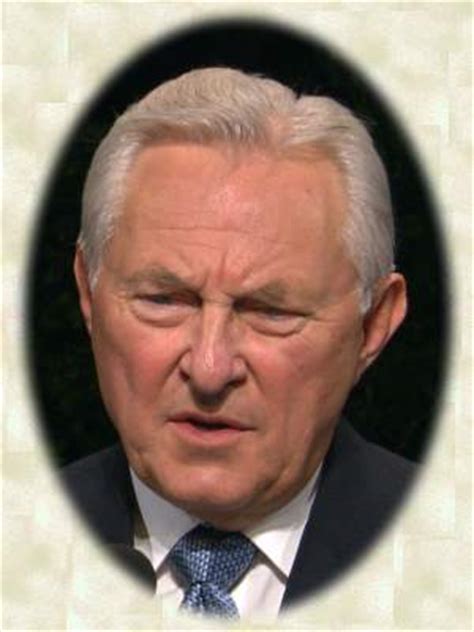A Quote by Neal A. Maxwell
In conclusion, the submission of one's will is really the only uniquely personal thing we have to place on God's altar. The many other things we 'give,' brothers and sisters, are actually the things He has already given or loaned to us. However, when you and I finally submit ourselves, by letting our individual wills be swallowed up in God's will, then we are really giving something to Him! It is the only possession which is truly ours to give!
Quote Topics
Actually
Altar
Brothers
Brothers And Sisters
Conclusion
Finally
Give
Given
Giving
God
God's Will
Him
However
Individual
Letting
Many
Only
Other
Our
Ours
Ourselves
Personal
Personal Thing
Place
Possession
Really
Sisters
Something
Submission
Submit
Swallowed
Then
Thing
Things
Truly
Uniquely
Up
Us
Which
Will
Wills
Related Quotes
Our challenge is to unselfishly sacrifice all that we have been given, including our will. Elder Neal A. Maxwell rightly said: “The submission of one’s will is really the only uniquely personal thing we have to place on God’s altar. The many other things we ‘give’ … are actually the things He has already given or loaned to us.
The humble, simple souls, who are little enough to see the bigness of God in the littleness of a Babe, are therefore the only ones who will ever understand the reason of His visitation. He came to this poor earth of ours to carry on an exchange; to say to us, as only the Good God could say: 'you give me your humanity, and I will give you my Divinity; you give me your time, and I will give you My eternity; you give me your broken heart, and I will give you Love; you give me your nothingness, and I will give you My all.
If we hold tightly to anything given to us unwilling to allow it to be used as the Giver means it to be used we stunt the growth of the soul. What God gives us is not necessarily "ours" but only ours to offer back to him, ours to relinguish, ours to lose, ours to let go of, if we want to be our true selves. Many deaths must go into reaching our maturity in Christ, many letting goes.
I believe that God will help us to forget things, the memory of which would do us harm, or rather that He will enable us to remember only so much of them as will be for our good, and we, ourselves, not emotionally overwhelmed. The pain endured. The lesson learned. Let it now be forgotten! Face the future with courage, cheerfulness, and hope. Give God the chance and He will make you forget all that it would be harmful to remember.
Prayer brings to us blessings which we need, and which only God can give, and which prayer can alone convey to us ... This service of prayer is not a mere rite, a ceremony through which we go, a sort of performance. Prayer is going to God for something needed and desired. Prayer is simply asking God to do for us what he has promised us he will do if we ask him ... Asking is man's part. Giving is God's part. The praying belongs to us. The answer belongs to God.
God never estimates what we give from impulse. We are given credit for what we determine in our hearts to give; for the giving that is governed by a fixed determination. The Spirit of God revolutionises our philanthropic instincts. Much of our philanthropy is simply the impulse to save ourselves an uncomfortable feeling. The Spirit of God alters all that. As saints our attitude towards giving is that we give for Jesus Christ's sake, and from no other motive.
Love is the greatest thing that God can give us; for Himself is love: and it is the greatest thing we can give to God; for it will also give ourselves, and carry with it all that is ours. The apostle calls it the band of perfection; it is the old, and it is the new, and it is the great commandment, and it is all the commandments; for it is the fulfilling of the Law.
If we feel that any habit or pursuit, harmless in itself, is keeping us from God and sinking us deeper in the things of earth; if we find that things which others can do with impunity are for us the occasion of falling, then abstinence is our only course. Abstinence alone can recover for us the real value of what should have been for our help but which has been an occasion of falling. ... It is necessary that we should steadily resolve to give up anything that comes between ourselves and God.
So let us ask ourselves this evening, in adoring Christ who is really present in the Eucharist: do I let myself be transformed by him? Do I let the Lord who gives himself to me, guide me to going out ever more from my little enclosure, in order to give, to share, to love him and others? Brothers and sisters, following, communion, sharing. Let us pray that participation in the Eucharist may always be an incentive: to follow the Lord every day, to be instruments of communion and to share what we are with him and with our neighbour. Our life will then be truly fruitful.



































